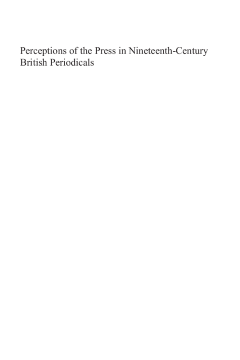
Additional Information
Book Details
Abstract
This annotated bibliography of nineteenth-century British periodicals, complete with a detailed subject index, reveals how Victorian commentaries on journalism shaped the discourse on the origins and contemporary character of the domestic, imperial and foreign press. Drawn from a wide range of publications representing diverse political, economic, religious, social and literary views, this book contains over 4,500 entries, and features extracts from over forty nineteenth-century periodicals. The articles cataloged offer a thorough and influential analysis of their journalistic milieu, presenting statistics on sales and descriptions of advertising, passing judgment on space allocations, pinpointing different readerships, and identifying individuals who engaged with the press either exclusively or occasionally. Most importantly, the bibliography demonstrates that columnists routinely articulated ideas about the purpose of the press, yet rarely recognized the illogic of prioritizing public good and private profit simultaneously, thus highlighting implicitly a universal characteristic of journalism: its fractious, ambiguous, conflicting behavior.
“E. M. Palmegiano’s ‘Perceptions of the Press in Nineteenth-Century Periodicals’ has given the scholar and the curious researcher together a welcome and extremely rich literary treasure which will enhance the comprehension of the role and influence of the historical British Press right to modern times.” —David R. Spencer, Professor of Information and Media Studies, University of Western Ontario
“Anyone interested in nineteenth-century journalism will covet this unique reference work. It is of enormous value to historians considering journalism during the century in which British power and influence reached around the globe. Its concise annotations also offer an absorbing read for anyone interested in knowing how the Victorian-era press established journalism standards still widely accepted in the twenty-first century.” —Ross F. Collins, Professor of Communication, North Dakota State University
This annotated bibliography of nineteenth-century British periodicals, complete with a detailed subject index, reveals how Victorian commentaries on journalism shaped the discourse on the origins and contemporary character of the domestic, imperial and foreign press. Drawn from a wide range of publications that represent diverse political, economic, religious, social and literary views, this book contains over 4,500 entries, and features extracts from over 40 nineteenth-century periodicals.
The featured articles discuss both the prior and the contemporary press, from annuals to dailies, and examine topics such as circulation, content, audience and personnel. These nineteenth-century commentaries offer both a thorough and influential analysis of their journalistic milieu, presenting statistics on sales and descriptions of advertising, passing judgment on space allocations, pinpointing different readerships, and identifying individuals who engaged with the press either exclusively or occasionally.
The essays also examine the impact of outside forces – including technology, taxation, capitalism and compulsory education – whilst assessments of the press abroad add the further considerations of geography, ethnicity, resources and restraints to the collective analysis. Most importantly, the bibliography demonstrates that columnists routinely articulated ideas about the purpose of the press, yet rarely recognized the illogic of prioritizing public good and private profit simultaneously. The volume thus highlights implicitly a universal characteristic of journalism: its fractious, ambiguous, conflicting behavior – an endemic trait that appears to have survived well into the twenty-first century.
“During the nineteenth century, the British periodical press took the world for its subject. Fuelled by growing literacy rates and advances in techniques in printing and distribution, the press grew exponentially. By turns brilliant, wide-ranging, analytical, opinionated, and informative, the press for the most part managed to avoid that great sin of dullness. It’s hard to think of a major decision or policy in which the press did not play a significant role. And so what the press thought about its role, what individual periodicals thought about their own mission, and how they perceived other papers is central to any attempt to understand both the press and nineteenth-century life more broadly. With ‘Perceptions of the Press’, E. M. Palmegiano has given scholars a most valuable tool to understand that extraordinary entity that came, one might almost say, to rule public life.” —Robert Scholnick, Professor of English and American Studies, College of William and Mary
“Building on her previous outstanding work on nineteenth-century journalism, the author provides us with an incredibly rich and meticulous overview of how journalism was discussed in a wide range of periodicals throughout the century. The result is a treasure-trove of information, a vital insight into the formation of a field of scholarship and a commercial activity.” —Martin Conboy, Professor of Journalism History, University of Sheffield
“Almost anyone seriously interested in the nineteenth-century press will find this book useful. […] [T]he value of this welcome volume is its bibliography and two indexes, which are thoroughly professional and well presented. Every research library should have a copy of this book in its reference collection.” —Anne Humpherys, “Victorian Periodicals Review”
“This is an invaluable aid to researchers and historians seeking insights into how the various aspects of the press were addressed and written about in nineteenth-century British periodicals. The compilation of sources and annotations collected here allow the modern researcher to gauge how journalism as practiced by many hands in the nineteenth century was perceived.” —Tamara Baldwin, Chair and Professor of Mass Media, Southeast Missouri State University
E. M. Palmegiano is a professor of history at Saint Peter’s College in Jersey City, New Jersey, where she currently holds the Senior Research Professor Award.
